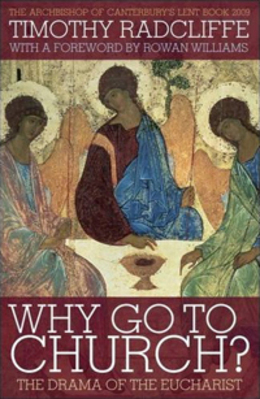Archbishop's Lent Book 2009

Wednesday 25th February 2009
The Archbishop of Canterbury, Dr Rowan Williams, has chosen 'Why Go To Church?' by Timothy Radcliffe, as his Lent Book for 2009.Archbishops of Canterbury have commissioned an 'Archbishop of Canterbury's Lent Book' for decades, collaborating with a Christian publisher. The books concentrate on theological or devotional Christian themes relevant to Lent, in preparation for the celebration of the passion and resurrection of Jesus Christ in Holy Week and Easter. The Archbishop commissions the author, and always writes the foreword.
The foreword by the Archbishop of Canterbury:
'The unobserved drama is in the core of our humanity': this striking phrase occurs early on in Timothy Radcliffe's engaging and penetrating book. And it tells us that the answer to the question in his title is going to be about how 'church' allows us to be human in ways we shan't find anywhere else.
He draws on an exceptionally wide experience of ministry. When he writes about what it is like to give voice to gratitude and praise in the middle of conditions of the most extreme danger and poverty, he knows what he is talking about; and one of the moving and distinctive things in the book is the way in which he brings in the insights of his Dominican brothers and sisters across the globe in their diverse and often very costly ministries.
As he leads us through one of the two most important events that ever occur in church—the celebration of Holy Communion—he shows us how the journey into the heart of Jesus' self-giving is also a discovery of who we are and who we might become in Jesus. The drama at the core of our humanity is about our reluctance to be human; and the gift that the Church offers is the resource and courage to step into Jesus' world and begin the business of being human afresh – again and again, because our reluctance keeps coming back. But if we do take such a step, the look of the country changes: strangers are less threatening, it becomes possible to live more with our own failure and humiliation, and we may even be able to have a faint idea of what it means to claim that human life is created for joyful sharing in God's life. And more – we become ambassadors for this new world, seeking wherever we are to let men and women know that violence and death do not have the last word where humanity is concerned.
It is a great delight to be able to introduce the work of one of the most lively and creative preachers of the gospel in the Roman Catholic Church today; and I hope that these pages will remind us all that, whatever tensions and unfinished business still lie between the historic churches, the basic commitment is one and the same. It is to let God the Holy Trinity, through the life, death and resurrection of Jesus, touch the core of our humanity and, as Timothy writes at the very end of the book, 'free us to be sent' in God's name, to announce healing and joy to all creation.
Only a vision like this can get us out of bed on Sunday mornings, as he rightly reminds us! 'Our duty and our joy' need to be held together, so that we come to worship in the confidence that this is where we are most completely at home with our Maker and Redeemer – and so with ourselves as well.
+ Rowan Cantuar:
